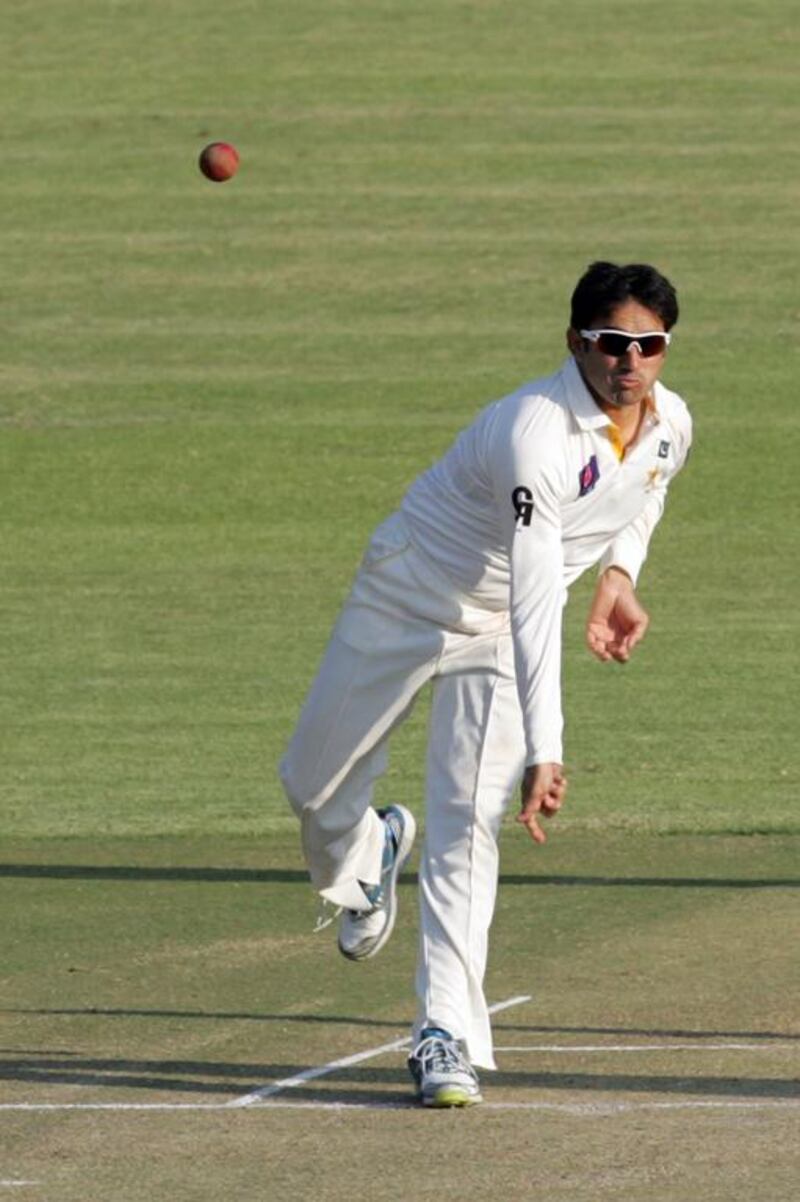The simple question is this: have Pakistan become too reliant on Saeed Ajmal? The nature of cricket, more than other team sports, unfortunately means there is no simple answer.
Individual confrontations are the central plank on which the wider collaborative battle turns and so individual reward – and scorn – the focus.
Pakistan have known this forever and at their best have managed to find a beautiful, fragile alchemy between those who win games and those who quietly help them win games.
But in tougher times the balance has been more difficult – in the 60s, as just one example, the reliance on Hanif Mohammad was too great and ultimately too burdensome for individual and team.
Are they now there with Ajmal? Well, Aaqib Javed, a former Pakistan bowling coach and a fine helper to match-winners himself, was asked on Wednesday what tips he would give to South Africa ahead of the Tests.
“Simple. They have to tackle Ajmal. If they tackle him as they did in South Africa, then it is going to be their series.”
It is easy to see why Aaqib – and many others probably – think so. Ajmal has been at the forefront of all Pakistan success since he became a permanent presence in all three formats in 2011.
From the start of that year to date, he is by a distance the leading wicket-taker in the world across all formats (at 248, 58 ahead of James Anderson).
Pakistan have leaned heavily on Ajmal and it was legitimate to ask, before the Zimbabwe tour, whether or not he should be rested.
Nobody has bowled more overs than him in this time (although Graeme Swann has only bowled five overs less).
But as a share of all Pakistan’s overs, that is around 22.5 per cent; in a four or five-man bowling attack, that proportion is normal.
But it is over five days where the reliance on him has felt particularly burdensome. He has bowled 1017.2 overs in 19 Tests since the start of 2011, which is nearly 29 per cent of all Pakistan’s overs. Proportionally that sounds right because he has taken 31 per cent of their Test wickets, too.
He is bowling nearly 54 overs a Test, which is a demanding workload. Yet three spinners from around the world – Ravi Ashwin, Praghyan Ojha and Monty Panesar – have bowled more per Test on average in that time. Sri Lanka’s main man, Rangana Herath, bowls marginally less overs per Test.
The thing is though, more than these figures, it is that you can see how much Misbah-ul-Haq has depended on him.
Every time he has needed a wicket or to control the run-rate, he has inevitably looked to Ajmal. On many days Ajmal has been the only real plan Pakistan have had.
Over the last year just every so often, during a long spell maybe, he has looked a little flat, a little tired maybe, a little out of ideas and a little like it has been too much. To his unending credit it has not usually been for too long but that intrinsic zest of 2011 and the start of 2012 sometimes has been lost.
This could just be over-scrutinising. Batsmen after all are bound to eventually start picking him better. Pakistan have also had an unusual and difficult rhythm of Test play: a clutch of games, then three long gaps, now another bunch of Tests. That cannot help.
This winter should tell us more for both Pakistan’s opponents have played Ajmal better than any other. Though Sri Lanka have given him wickets, the cost and rate at which they have come has been high enough for it to not be so damaging; Kumar Sangakkara has easily been the most assured opponent Ajmal has bowled to.
South Africa have been even more successful. If you take away his 10 wickets in Cape Town in February this year, he has just four wickets in three other Tests against them. Hashim Amla and AB de Villiers specifically have been proactive against Ajmal, using their feet and wanting to score swiftly.
That 10-wicket haul, special as it was, came in a lost Test, the second time it has happened in Ajmal’s career.
Twice more he has taken 10 and won Tests. Does that leave the debate about his Atlas-ness evenly undecided?
Sure, but it is best to remember that even in Ajmal’s standout individual performance – that England whitewash – he had support from Abdur Rehman and spells from Mohammad Hafeez and Umar Gul.
osamiuddin@thenational.ae
SWOT ANALYSIS
Other key players for Pakistan
Younis Khan
Pakistan’s best and most experienced batsman. He has a good record against South Africa and will need to score at least one hundred somewhere if Pakistan are to put up a reasonable total.
Junaid Khan
Junaid bowled superbly in Zimbabwe and has been one of the most promising pace prospects for a couple of years now. Pakistan need a breakthrough performance from him against a top side.
Abdur Rehman
Happy to stay away from the spotlight, Rehman will have a critical role in the series. Saeed Ajmal will be the frontline attacker, but Rehman, below, needs to back him up, especially in the absence of Mohammad Hafeez.
Why Pakistan will win:
The UAE is now Pakistan’s home ground. They have yet to lose a Test here, let alone a series, since they started playing regularly in 2010. Their spinners – and batsmen – prefer their wickets low and slow. South Africa’s pace bowlers, especially Vernon Philander, might also not be as big a threat as on other, quicker surfaces.
Why Pakistan will not win:
They are up against the best Test side in the world, unbeaten in a series away from home since July 2006, winning an amazing eight out of 11 series around the world. They have the world’s best opening pace attack, two of the world’s best batsmen and a colossus of a captain. Do you need any more reasons?





